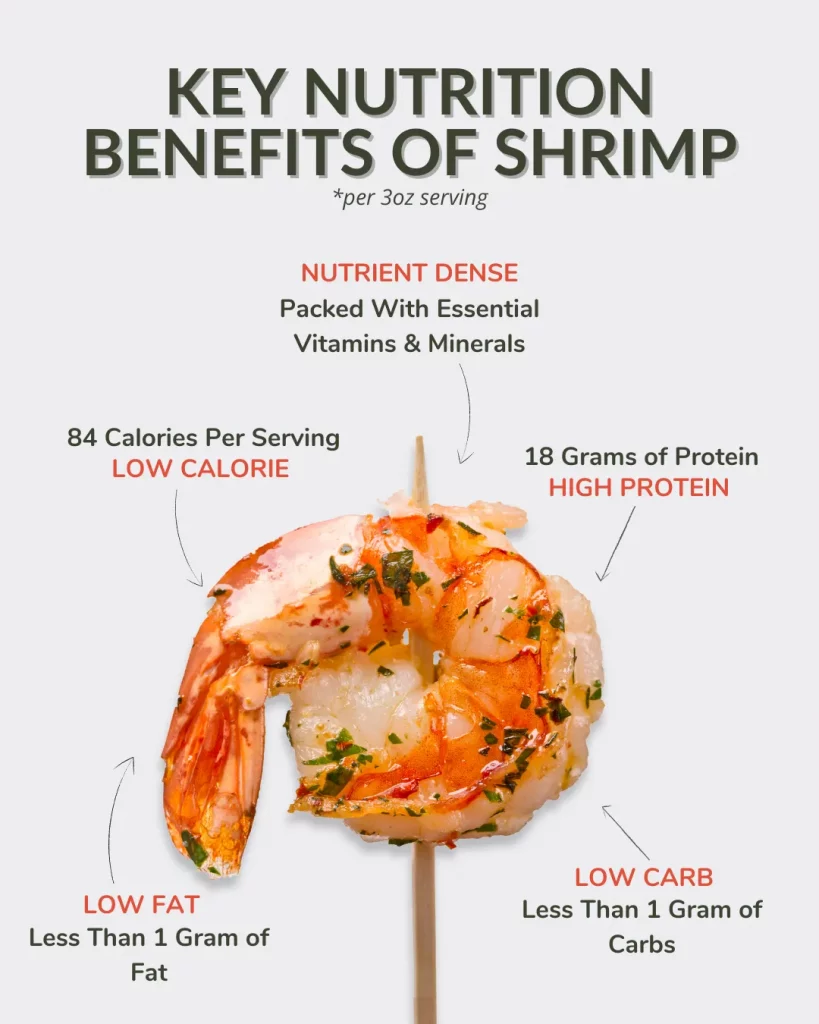Boiled, steamed, fried, scampied, grilled—there’s no shortage of delicious ways to prepare shrimp for any meal and mood. If you were to eat some delectable version of these crustaceans more often, though, what kind of rewards might you reap, aside from a mood boost? We’re diving into the nutritional story behind shrimp: Calories, nutrients, carbs, and so much more.
Table of Contents

Nutritional Profile of Shrimp: Calories, Nutrients, Cholesterol, and More
If you’ve got questions about shrimp calories and nutritional value, we have good news: These tiny treasures pack a major punch.
When it comes to shrimp calories, you’ll be happy to know that they are low and essential nutrients are high, making them a perfect choice for health-conscious individuals. Here’s a breakdown of the nutritional content of a 3-ounce serving of cooked shrimp (think around a dozen medium shrimp, 8 large shrimp, or 3 jumbo shrimp):
Calories
One 3-ounce serving of shrimp is equivalent to approximately 84 calories. Shrimp calories are fairly low compared to some other seafood favorites. An equivalent serving of sardines is around 101 calories, while one 100-gram serving of salmon contains around 185 calories.
Protein
Aside from shrimp calories, a serving of shrimp amounts to a whopping 18 grams of protein, making shrimp an excellent source of this nutrient.
Fat
Shrimp are low in fat, with less than 1 gram per serving. The fat they do contain is predominantly unsaturated, which is beneficial for heart health.
Carbohydrates
Shrimp contains a negligible amount of carbohydrates—less than 1 gram in a 3-ounce serving—making it a suitable option for those following low-carb diets.
Cholesterol
Though shrimp calories are on the low end, shrimp are known to be high in cholesterol, with around 160 mg of the substance in a 3-ounce serving. However, research suggests that this kind of dietary cholesterol has minimal impact on blood cholesterol levels for most people.
Omega-3 Fatty Acids
Shrimp are a good source of omega-3 fatty acids, particularly EPA (eicosapentaenoic acid) and DHA (docosahexaenoic acid), which are essential for brain health and reducing inflammation in the body.
Vitamins and Minerals
Shrimp contain various beneficial vitamins and minerals, including vitamin B12, selenium, phosphorus, choline, and copper. These nutrients play crucial roles in metabolism, brain function, immune health, and antioxidant defense, to name just a few.
Health Benefits of Shrimp
As you’ve likely guessed by now, making shrimp a regular part of your diet can have major health benefits.
High-Quality Protein Source
Shrimp are an excellent source of high-quality protein, providing all the essential amino acids your body needs for muscle repair, immune function, and overall health.
Heart Health
Despite their cholesterol content, shrimp can be part of a heart-healthy diet. Their low levels of saturated fat and high levels of omega-3 fatty acids can help reduce the risk of heart disease by lowering levels of triglycerides and improving cholesterol profiles.
Brain Health
The omega-3 fatty acids found in shrimp, particularly EPA and DHA, are crucial for brain health and cognitive function. Regular consumption of omega-3s has been linked to a reduced risk of cognitive decline and may help improve mood and memory.
Weight Management
With their low calorie and high protein content, shrimp can be a valuable addition to weight loss or weight management diets. Protein helps keep you feeling full and satisfied, reducing the likelihood of overeating.
Nutrient Density
Shrimp are packed with essential vitamins and minerals, providing a concentrated source of nutrients in a low-calorie package. It is a notable source of:
- B12
- Zinc
- Copper
- Omega-3
- Astaxanthin
This makes them an ideal choice for individuals looking to maximize their nutrient intake without consuming excess calories.
Tips for Enjoying Shrimp
Shrimp calories and carbs aside, if you’re looking for ways to work more shrimp into your diet here are a few tips to keep in mind:
Choose Quality Sources
Opt for fresh or frozen shrimp from reputable sources to ensure quality and minimize the risk of contamination.
Experiment with Cooking Methods
Shrimp can be grilled, boiled, sautéed, or even added to salads and stir-fries for a delicious and nutritious meal.
Pair with Healthy Sides
Serve shrimp with plenty of vegetables, whole grains, and healthy fats to create a balanced meal that’s both satisfying and nutritious.
Our Favorite Shrimp Recipes
At NC Seafood Restaurant, we know how to whip up the perfect shrimp dish. Here are some of our favorite shrimp recipes for a healthy home-cooked meal.
Shrimp and Veggie Stir-Fry
Heat a tablespoon of olive oil in a large skillet or wok over medium-high heat. Add a pound of peeled and deveined shrimp to the skillet and cook for 2-3 minutes until they turn pink and opaque.
Remove the shrimp and set them aside. In the same skillet, add your favorite vegetables such as bell peppers, broccoli florets, snap peas, and sliced carrots. Stir-fry the vegetables for 4-5 minutes until they are tender yet crisp.
Return the cooked shrimp to the skillet and toss everything together. Season with a splash of low-sodium soy sauce, minced garlic, ginger, and a pinch of red pepper flakes for a hint of heat.
Serve the shrimp and veggie stir-fry hot over brown rice or quinoa for a nutritious and satisfying meal.
Grilled Shrimp Salad
Preheat your grill to medium-high heat. In a bowl, toss a pound of large peeled and deveined shrimp with a drizzle of olive oil and a squeeze of fresh lemon juice.
Season the shrimp with salt, pepper, and your favorite herbs (we recommend thyme or oregano). Thread the seasoned shrimp onto skewers and grill for 2-3 minutes on each side until they are cooked through and slightly charred.
Meanwhile, assemble a salad with mixed greens, cherry tomatoes, cucumber slices, thinly sliced red onion, and avocado chunks. Top the salad with the grilled shrimp skewers and drizzle with a light vinaigrette made with olive oil, balsamic vinegar, Dijon mustard, and honey.
Coconut Curry Shrimp
In a large saucepan, heat a tablespoon of coconut oil over medium heat. Add diced onion, minced garlic, and grated ginger to the saucepan and sauté until fragrant. Stir in a tablespoon of curry powder, a teaspoon of turmeric, and a pinch of cayenne pepper for added spice.
Pour in a can of light coconut milk and bring the mixture to a simmer. Add a pound of peeled and deveined shrimp to the saucepan and cook for 4-5 minutes until the shrimp are cooked through. Stir in a handful of baby spinach leaves and let them wilt in the curry sauce.
Serve your coconut curry shrimp hot over cooked quinoa or brown rice, garnished with chopped cilantro and a squeeze of fresh lime juice.
Final Word: Shrimp Calories & Nutrition
Shrimp is not only delicious, it’s also rich in nutrients and vitamins. Incorporating shrimp into your meals in moderation and pairing them with your other favorite foods is one of the easiest, fool-proof ways to serve up a dinner or lunch that makes a splash.
Craving shrimp without the work? Stop by NC Seafood Restaurant today and let us treat you to one of our Calabash-style jumbo shrimp plates, complete with hush puppies, home fries, and coleslaw. Check out our full menu and place your order online. And don’t forget to sign up for our once-monthly newsletter below. We promise to only email once per month and make it short and sweet — only updating you with our latest news.
